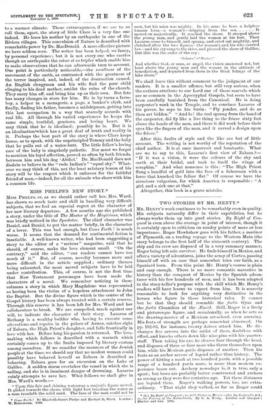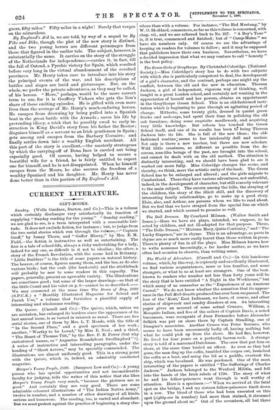TWO STORIES BY MR. HENTY.*
MIL HENTY'S work continues to be remarkably even in quality. His subjects naturally differ in their capabilities, but he always works them up into good stories. By Bight of Con- quest is even above the average in point of interest, though it is certainly open to criticism on sundry points of more or less importance. Roger Hawkshaw goes with his father, a mariner of Plymouth, on a trading voyage to the Western Main (the story belongs to the first half of the sixteenth century). The ship and its crew are disposed of in a very summary manner, Roger being left sole survivor. He finds himself in Mexico, and after a variety of adventures, joins the army of Cortez, passing himself off with an ease that somewhat tries our faith, as a Spaniard born. From this point Mr. Henty's course is plain and easy enough. There is no more romantic narrative in history than the conquest of Mexico by the Spanish adven- turer with his few hundreds of men, and it has been adapted to the story-teller's purpose with the skill which Mr. Henty's readers will have learnt to expect from him. It is scarcely reasonable to look for anything very distinctive in the heroes who figure in these historical tales. It cannot but be that they should resemble the fortis Gyas and the fortis Cloanthus of the iFneid. Still, Roger is a lively and picturesque figure, and occasionally, as when he acts as the drawing-master of a Mexican art-school, even amusing. His feats of strength are perhaps somewhat abnormal. On pp. 192-93, for instance, twenty Aztecs attack him. He dis- charges five arrows into the midst of them, doubtless with effect, and knocks others down like nine-pins with his quarter- staff. Then taking his axe, he cleaves four through the head, and disposes of three or four more who throw themselves upon him, while his Mexican guide disposes of another. Then his feats as an archer savour of legend rather than history. The power of hitting a mark at two hundred yards, with a possible range of a hundred yards more, is more than modem ex- perience bears out. Archery nowadays is, it is true, only a sport ; but bows are probably better constructed and archers as strong as they were five centuries ago. Yet these distances are beyond them. Roger's walking powers, too, are extra- ordinary. " That night they walked, as far as Roger could • (1.) By Right of Conquest ; or, with Cortez in Merico.—(2.) By England's Aid ; or, the Freeing, of the Netherlands. By G. A. /Linty. London and Glasgow Mackie and bon. 1891.
guess, fifty miles." Fifty miles in a night! Surely that verges on the miraculous.
By England's Aid is, we are told, by way of a sequel to By Pike and Dike, though the plot of the new story is distinct, and the two young heroes are different personages from those that figured in the earlier tale. The subject, however, is substantially the same. It carries on the story of the struggle of the Netherlands for independence,—carries it, in fact, till the fall of Ostend, a Pyrrhic victory for Spain, which resulted before very long in the virtual abandonment of the revolted provinces. Mr. Henty takes care to introduce into his story the principal events of the war, and his descriptions of battles and sieges are lucid and picturesque. But, on the whole, we prefer the private adventures, as they may be called, of his heroes. " Hero," perhaps, would be the more correct term to use, for it is Geoffrey Vickars who gets the lion's share of these exciting episodes. He is gifted with even more lives than the average of Mr. Henty's much-enduring heroes. He escapes from drowning by being pulled into a Spanish boat in the great battle with the Armada ; saves his life by pretending idiocy, a trick that he possibly owed to early in- struction in King David's story from his father the Rector; disguises himself as a servant to an Irish gentleman in Spain ; gets among and escapes from the Barbary Corsairs ; and finally settles down into a wealthy English merchant. All this part of the story is excellent,—the masterly stratagems by which the carrying-off of Dona Inez is carried out being especially good. Of course, having helped to secure a beautiful wife for a friend, he is fairly entitled to expect one for himself, and he is not disappointed. When he himself escapes from the Moors, he also secures the freedom of a wealthy Spaniard and his daughter. Mr. Henty has never done better than in this portion of By England's Aid.



















































 Previous page
Previous page